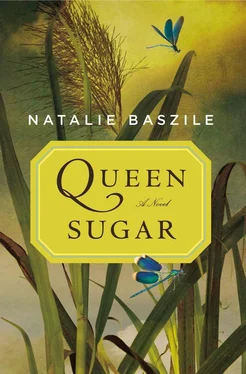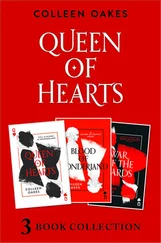“How was your first day?” Miss Honey asked.
Charley turned away from the window. She took a Coke from the refrigerator. “Things keep getting better and better,” she said darkly. “Denton says I need another sixty-five thousand dollars. Shit!” In Miss Honey’s kitchen, Charley felt the full weight of what she was up against. Sixty-five thousand dollars more, and that would only get them to October. Where would she get that kind of money?
“One thing I don’t allow in my house is foul language,” Miss Honey said without missing a beat in her chopping. “That and taking the Lord’s name in vain.”
Her mother was right. She was a dreamer; had always been. But where had it gotten her? “This is the stupidest thing I’ve ever done,” Charley said. The kitchen was quiet except for the whir of the ceiling fan. “I know I sound ungrateful, and I don’t mean to, but I wish Dad hadn’t left me this farm. I was doing a good job fucking up on my own. Now I have eight hundred acres to remind me I’m a failure. I’m just making a fool of myself.”
Miss Honey scowled and Charley realized she’d sworn again.
“You remember that first day when we drove out to your farm?” Miss Honey said. “That day Frasier quit?”
Charley nodded. Of course. How could she forget?
Miss Honey stopped chopping, wiped her hands on a dish towel. “Well, your daddy worked out there one summer when he was a boy.”
“Out where?”
“Those fields you own. That same land. I didn’t recognize it at first, it’s been years since I was out that way. The trees are much bigger.”
“Dad never told me about working cane,” Charley said. She knew a lot about her father. For instance, she knew how much he hated the South. So eager to escape, he skipped his high school graduation dance and the parties, packed his clothes in a cardboard suitcase, and caught a ride to California with a woman from town who needed someone to share the driving and the cost of gas. He had sixty-three dollars in his pocket. He was seventeen. Years later, when she was a girl and her father brought her back to Saint Josephine for summer visits, he couldn’t last more than a week before his mood curdled. He grew antsy, short-tempered. Small things — the sound of a train whistle, the sight of an old black man pedaling his bicycle down the road, weeds sprouting through cracks in the sidewalk — annoyed him. But cutting sugarcane? Even when they sat in his living room and looked at The Cane Cutter , he never said a word.
“Can’t say I’m surprised he didn’t tell you,” Miss Honey said. “But soon as you said he bought the place from LeJeune, I put it together.” She pulled a chair out from the table and leaned heavily against it. Charley had lived with Miss Honey for almost a month. She had watched Miss Honey with Micah and knew she could be gentle; had seen Miss Honey explode at Violet, then turn around in the next moment and allow Violet to help her up the steps; but she had never seen Miss Honey look so troubled as she did now, as though her inner fire, the feistiness, her Miss Honey — ness, had drained away.
“Those were tough times,” Miss Honey said. She looked through the window. “I was taking in as much extra laundry as I could, cleaning for Miss Barbara on weekends. Pappaw was working extra shifts at the mill. All that, and we were barely getting by. Ernest was thirteen that year. He told me he wanted to work cane, but I told him no. I’d worked cane when I was a girl, and I knew how hard it was. ‘Go ask Mr. Henry down at the gas station if he has work for you,’ I told him. But Ernest didn’t listen. He got up before dawn and walked four miles to where they rang the big black bell. Got himself hired onto one of the crews making a dollar a day.”
Miss Honey fell silent, and for the first time, Charley thought she looked every one of her seventy-nine years, her skin thin as parchment, her shoulders slumping, her ankles swollen as popovers above her orthopedic sandals. “All that dirt is like an oven the way the heat rises up. You feel like passing out from thirst. ’Round ten, the supervisor set a water bucket at the edge of the field. Didn’t seem to be any order to it. Seemed like, you got thirsty, you drank from the bucket. But not that day. When it came time to break, Ernest was first in line. Reached for the ladle when something caught him upside his face. Said it felt like a hunk of metal. Andre LeJeune, making his daily rounds. He’d hit Ernest with a shovel. Let the white drink first . Couldn’t stand seeing a black boy drink ahead of him.”
Her father had been thirteen, Charley thought. Just two years older than Micah.
When Miss Honey spoke again her voice brimmed with regret. “My son kept that job till school started because he knew how bad we needed the money, but he didn’t tell me what happened till a month before he left for California.” She asked Charley to get her a Coke from the fridge, then tore open a packet of Stanback. “I used to wonder what that did to him, but after that day we were out there with Frasier, I knew.” Miss Honey took a deep breath, and Charley saw her mouth tremble. “It’s an awful thing when a mother can’t protect her own child.”
“I know,” Charley said. She would do anything to take back that day Micah burned herself. She would do anything, give anything, to have those hours back. Through the window, she heard the faint echo of Micah’s shovel as it sliced through the layer of grass, cut into the soil beneath. Miss Honey was right. It was an awful thing, the worst. The very, very worst thing of all.
“Ernest bought that land and never said a word,” Miss Honey said, looking small and frail sitting there with her hands in her lap. “Now he’s gone, and I can’t tell him how proud I am.” She stood and moved to the sink, but not before Charley saw her wipe her eyes.
• • •
Out beyond the town limit, the Missouri Pacific’s whistle announced midnight’s arrival, while in the pitch black of the front bedroom, Charley thought about Miss Honey’s story, imagined her father, just a boy, working the long rows of cane as the sun beat down, racing to the water bucket like any child would do. Charley rolled onto her side. She had to find the extra sixty-five thousand dollars. She had to get to October, then through to grinding. She slipped out of bed and walked down the hall to the kitchen, where the stove light threw off a soft glow. She flipped the light switch.
“Oh.”
Ralph Angel sat at the table confronting a heaping bowl of Frosted Flakes. He wore a T-shirt and boxers, and Charley, in only shorts and a tank top, folded her arms across her chest, thinking this was far too intimate for a brother and sister who hadn’t seen each other in twenty years. “Excuse me. I didn’t know anyone was in here,” she said, and was about to head back to her room when Ralph Angel spoke.
“Couldn’t sleep either, huh?”
Charley hadn’t seen much of Ralph Angel since he teased Hollywood the night of the reunion. But looking at her brother now, she thought he looked smaller without the warm-up jacket, almost harmless sitting there with the big box of kid’s cereal. “The heat at night,” Charley said. “It’s the one thing I haven’t gotten used to.”
Ralph Angel poured more cereal into his bowl then pushed the box across the table. “Help yourself,” he said standing up, going to the sink, holding his bowl under the tap.
Charley stared.
“What?”
“Nothing, I guess,” Charley said. “It’s just that I’ve never seen anyone eat cereal with water before.”
“I been thinking.” Ralph Angel turned off the tap and sat down again. “We sort of got off on the wrong foot the other night.”
Читать дальше












